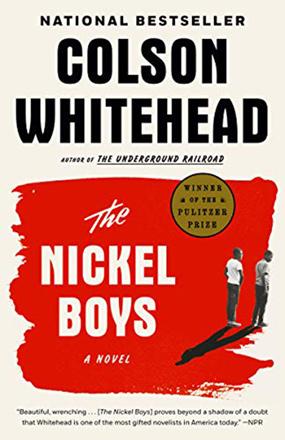- Mix
- Web-2021-07-14 | 02:20 pm

Nayrouz News Agency :
Following his success with "The Underground Railroad”, Colson Whitehead again mixes real history with his expansive imagination to create a new chronicle of the Black experience in America, called "The Nickel Boys”. Both novels have won the coveted US Pulitzer Prize for Fiction.
Based on an actual, so-called reform school for boys in Florida, opened at the end of the 19th century, "The Nickel Boys” is mostly set in the 1960s, and follows the fate of Elwood Curtis, raised by his grandmother Harriet after his parents absconded to California. Growing up in the heat of the civil rights movement, he is bolstered by Harriet’s strict, but loving care and inspired by the writings of Martin Luther King. Harriet believes that one will face divine retribution for trying to surpass one’s station in life, but Elwood nonetheless begins to participate in protest marches. He self-educates himself alongside regular school, and a sympathetic teacher has just arranged for him to attend free classes at a nearby college when a cruel twist of fate lands him in the Nickel Academy for Boys instead.
Elwood’s story continues on two prongs: Concrete and allegorical. The first means experiencing the all too real physical, sexual and psychological abuse enacted at the school, from malnourishment and non-existent teaching, to setting students against each other, and cruel, protracted beatings administered by sadistic white adults for arbitrary reasons. Some victims land in the school infirmary; others in a secret graveyard (like the mass graves recently uncovered in Canada on the grounds of boarding schools for Native American children). White boys at Nickel are also subjected to these punishments, but to a lesser degree. Perhaps Whitehead wants to remind that a system based on hate, fear and violence is bad for everybody, regardless of skin colour.
The author’s ability to convey these atrocities in matter-of-fact, understated prose makes the narrative more intense, credible, and horrifying than any melodramatic description could have done. Clearly, Whitehead intends to figuratively recreate the system at the school-cum-prison as a microcosm of the segregated, Jim Crowe system prevailing in the Southern states post-civil war. Like the school, this system used a combination of fear, deprivation and violence to keep Black people in a position not much better than slavery, thwarting their every effort to better their lives. Like during slavery, there were economic incentives for the white masters (school administrators) who sold off the state-provided food and supplies of the Black kids and hired them out to do unpaid labour for wealthy backers of the school. Last but not least, there were only hazy criteria for being released, adding to the students’ disorientation.
In this system, "It was crazy to run and crazy not to run. How could a boy look past the school’s property line, see that free and living world beyond, and not contemplate a dash to freedom? To write one’s own story for once. To forbid the thought of escape, even that slightest butterfly thought of escape, was to murder one’s humanity”. (p. 148)
Elwood is an exception among the Nickel boys, many of whom have no family to go back to, were they to be released, and most of whom are illiterate. Some are easily recognisable as children of special needs. Most were incarcerated for minor offenses. "All the violent offenders, Elwood added, were on staff”. (p. 76)
The other prong of the story is a quasi-allegory with Elwood as the morally upright central character — the striver, the seeker, the pilgrim, who believes in justice and redemption — that it is possible for Black people to achieve their rights if only they do the right thing. Elwood’s only friend at the school, Turner, is a good person at heart but has been rendered totally cynical by his life experience. He serves as Elwood’s foil, openly ridiculing his naivete and adding a dose of harsh realism. "The blinders Elwood wore, walking around. The law was one thing — you can march and wave signs around and change a law if you convinced enough white people… Turner saw the college kids with their nice shirts and ties sit in at the Woolworths. He had to work, but they were out protesting. And it happened — they opened the counter. Turner didn’t have the money to eat there either way.” (p. 105)
The interplay between Elwood and Turner is edifying and heart-warming, especially as it is one of very few caring relationships in the story. It is also key to how the plot unfolds and is resolved. As one nears the climax of the book, and Elwood makes his ultimate petition for ending the corruption at Nickel, several possible endings suggest themselves, but Whitehead ends his tale in a totally unexpected way, perhaps striving to mirror the arbitrary irony that often rules Black people’s lives as a result of racism.
In telling an old story in modern metaphor, it is significant that Whitehead quotes extensively from Martin Luther King so many years after his death: "Throw us in jail, and we will still love you… beat us and leave us half-dead, and we will still love you… be ye assured that we will wear you down by our capacity to suffer, and one day we will win our freedom.” (quoted on p. 172)
-
 Will Trump end up like Kennedy?2026-02-03
Will Trump end up like Kennedy?2026-02-03








